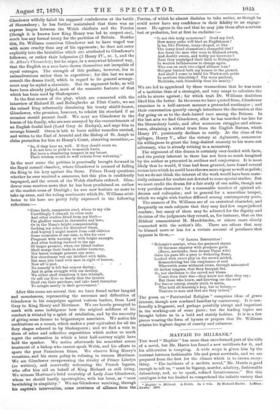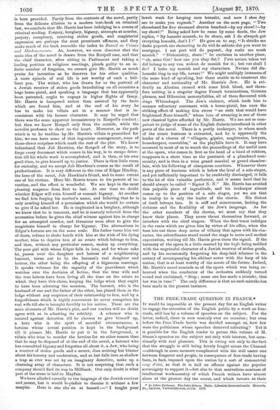MAYFAIR TO MILLBANK.* Tim word " Mayfair " has more
than once formed part of the title of a novel, but Mr. Harris has found a new antithesis for it, and his alliteration is tempting. A wide scope is given him by the contrast between fashionable life and penal servitude, and we are prepared from the first for the climax which is to crown every- thing. "The incidents of a modem novel," Mr. Harris is good enough to tell us, "must be bigamy, murder, adultery, fashionable debauchery, and, so to speak, refined licentiousness." But this catalogue is far too limited to comprehend the infinite variety that
* Mayfair to Millbank. A Hovel. In 3 vole. By Richard Harris. Lokon : Newby. 1870. is here provided. Partly from the contents of the novel, partly from the delicate allusion to a modern text-book on criminal law, we conclude that Mr. Harris has been indulging in a course of criminal reading. Forgery, burglary, bigamy, attempts at murder, perjury, conspiracy, receiving stolen goods, and magisterial oppression are perhaps the most prominent offences, and they make much of the book resemble the index to Russell on Crimes and Misdemeanours. As, however, we soon discover that the main idea of the novel is drawn from the Roupell case, and that the chief character, after sitting in Parliament and taking a leading position at religious meetings, pleads guilty to an in- finite number of forgeries, we cannot give Mr. Harris as much praise for invention as he deserves for his other qualities. A mere episode of real life is not worthy of such a bril- liant pen. The writer, who has drawn for us the portrait of a Jewish receiver of stolen goods brandishing on all occasions a huge horse-pistol, and speaking a language that has apparently been patented, ought to engage in higher flights of fancy. Mr. Harris is hampered rather than assisted by the facts which are found him, and at the end of his story be has to make his villain act in a manner that is in- consistent with his former character. It may be urged that there was the same apparent inconsistency in Roupell's conduct ; but then we know Roupell only from the outside, while the novelist professes to show us the heart. Moreover, as the path which is to be trodden by Mr. Harris's villain is prescribed for him, we can have none of that ingenious management, none of those clever surprises which mark the rest of the plot. We know beforehand that Job Hawkins, the Roupell of the story, is to forge every document which comes in his way, is to escape detec- tion till his whole work is accomplished, and is then, at his own good time, to give himself up to justice. There is thus little room for curiosity, and we accept Job Hawkins's course as the result of predestination. It is very different in the case of Edgar Hindley, the hero of the novel, Job Hawkins's friend, and to some extent one of his victims. Here Mr. Harris trusts to his powers of in- vention, and the effect is wonderful. We are kept in the most pleasing suspense from first to last. At one time we doubt -whether Edgar will ruin himself or commit bigamy. At another we find him forging his mother's name, and believing that he is only availing himself of a permission which she would be certain to give if he asked her. He is implicated in a burglary, although we know that he is innocent, and he is scarcely relieved from the accusation before he gives the chief witness against him in charge for an attempted murder, and threatens soon after to give the magistrate himself in charge for bigamy. The alternations in Edgar's fortune are on the same scale. His father turns him out of doors, refuses to shake hands with him at the wish of his dying mother, tries to deprive him of an estate which belongs to him, and then, without any particular reason, makes up everything. The poor girl with whom Edgar falls in love, and for whose sake he. _passes over the daughter and heiress of a neighbouring baronet, turns out to be the baronet's real daughter and heiress, the other being the offspring of a bigamous marriage. It speaks volumes for the sagacity of the providence which watches over the destinies of fiction, that the true wife and the true heiress have been living all the time on the estate to which they have this claim, keeping the lodge when they ought to have been adorning the mansion. The baronet, who is the husband of one and the father of the other, has placed them in the lodge without any suspicion of their relationship to him, and by a forgetfulness which is highly convenient he never recognizes his real wife till she is brought forcibly to his notice. These are the main elements of Mr. Harris's plot, and our readers will no doubt agree with us in admiring its subtlety. A schemer who is insured against detection till he chooses to give himself up, a hero who is the sport of merciful circumstances, a heroine whose actual position is kept in the background till it pleases Mr. Harris to put it in the foreground, a villain who tries to murder the heroine for no other reason than that he may be disposed of at the end of the novel, a baronet who has committed bigamy and forgotten all about it, a Jew, who being a receiver of stolen goods and a usurer, does nothing but bluster about his honesty and moderation, and at last falls into as shallow a trap as ever was set by an imaginary detective, make up a charming array of characters. It is not surprising that such a company should find its way to Millbank. Our only doubt is what part of the scene is laid in Mayfair.
We have alluded casually to the language of the Jewish receiver and.usurer, but it would be:unfair to dismiss it without a few samples. Here is one cho en at hazard :—" I tought your
lawsh wash for keeping men honesht, and now I shee day are to make you roguesh." Another on the next page, "Two shoushand for five shousand sheven hundred—by my showl !—by my showl !" Being asked how he came by some deeds, the Jew replies, "By honesht meansh, to be shure, ash I do alwaysh get everyting honesht, don't I ?" He goes on to say, "It shtrike me deshe papersh are shometing to do wid de eshtate dat you want to mortgage. I not part wid de papersh, dey cosht me mush monish." " Dishonishty, share ! " he exclaims in another place, "oh, mine Got! how can you shay dat ? I'ave nevare taken vat did belong to any vun widout de monish for it ; but vat shall I do ? I loshe my monish and my charactare. Nevare did dis- honesht ting in my life, nevare!" We might multiply instances of the same kind of speaking, but these enable us to construct the character and nationality of Mr. Harris's Jew. He is evi- dently an Alsatian crossed with some Irish blood, and there- fore uniting in a singular degree French terminations, German phrases, and Hibernian monosyllables, all of them flavoured with stage Whitechapel. The Jew's violence, which leads him to menace refractory customers with a horse-pistol, has once the striking effect of making him swear "an oath that would have frightened Nero himself," whose love of swearing is one of those new classical lights afforded by Mr. Harris. We are not so com- petent to judge of some of the English dialects introduced in other parts of the novel. There is a portly innkeeper, to whom much of the comic business is entrusted, and he is apparently the leader of a chorus of "villagers, gipsies, magistrates, lawyers, housekeepers, constables," as the playbills have it. It may have occurred to most of us to watch the proceedings of the useful man at the opera, who comes in first as the head of a band of robbers, reappears in a short time as the patriarch of a plundered com- munity, and is then in a trice grand marshal or grand chamber- lain, with his following of obsequious courtiers. Whenever there is any piece of business which is below the level of a solo singer, and yet sufficiently important to be creditably discharged, it falls to the lot of this valuable performer, and it seems hard that he should always be called "Signor N. N." Mr. Harris has avoided this palpable piece of ingratitude, and his innkeeper almost comes up to the position of a solo singer, yet we see that in reality he is only the leader of the chorus. His dialect of itself betrays him. It is stiff and monotonous, lacking the richness and the flexibility of the Jew's language. As for the other members of the chorus, we must say that they know their places. They never thrust themselves forward, or interfere with the chief singers. When the first tenor indulges in the rants which are given him by virtue of his office, when the bass lets out those deep notes of villainy that agree with his cha- racter, the subordinates stand round the stage in mute and modest expectation, waiting till Mr. Harris gives them the signal. If the harmony of the opera is a little marred by the buffo being saddled with the ungrateful character of a Jewish receiver of stolen goods, and by his occasionally forgetting his deep-laid schemes in the ecstacy of accompanying his sibilant notes with the harp of his nation, that is at least worthy of the music of the future. Indeed, Mr. Harris's novel reminds us of the opera which was being re- hearsed when the conductor of the orchestra suddenly turned round and exclaimed, " Stop ; some one has made a mistake, that bar was in tune !" The only difference is that no such mistake has been made in the present instance.































 Previous page
Previous page